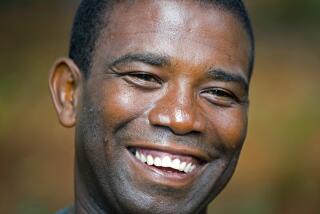Shultz Proclaims Haiti ‘Free at Last’ : Hails Progress Since Duvalier Regime, Pledges U.S. Help
- Share via
PORT-AU-PRINCE, Haiti — Secretary of State George P. Shultz, the highest ranking U.S. official to visit this impoverished island since the overthrow of the Duvalier family dictatorship six months ago, proclaimed Haiti on the verge of “a new era of democracy” Friday and said the United States is determined to help.
“After three decades of dictatorship, you are free at last--we will help you stay that way,” Shultz said in a brief speech after a 90-minute meeting with Lt. Gen. Henri Namphy, president of Haiti’s provisional government.
“You are on the right track and the American people want to help,” he added.
In his own speech, Namphy, clad in a khaki dress uniform, pledged to “build up a true and liberal democracy” in a Haiti, which until last February was ruled for nearly 29 years by Francois (Papa Doc) Duvalier who died in April, 1971, and then by his son, Jean-Claude (Baby Doc) Duvalier.
Shultz was the first U.S. secretary of state to visit Haiti since Phalander C. Knox came in 1912. Shultz stopped off for five hours on his way to the Dominican Republic where he will attend the inauguration today of President Joaquin Balaguer.
‘Tip Your Hat to Them’
“They have done substantive things in a short space of time in a tough situation and you have to tip your hat to them,” Shultz told reporters aboard his plane, speaking of the Namphy government.
A handful of Haitians demonstrated peacefully in downtown Port-au-Prince against the presence in Haiti of a Pentagon team surveying the nation’s need for military assistance. But the demonstrators did not interfere with Shultz’s schedule, and it is unlikely that he even saw them.
Washington currently provides only $750,000 in military aid to Haiti, less than 1% of its $80 million economic aid program. But the 11-member Pentagon group is expected to recommend a substantial increase in support to the army, which functions primarily as an internal security force.
A senior Administration official said the United States hopes to persuade Canada to launch a program to train police because of congressional prohibitions against U.S. assistance to police. He said that Washington would limit its assistance to military functions such as transportation and communications.
The official said the regular army was neglected by the Duvaliers, father and son, who relied on the feared Tontons Macoutes militiamen to enforce their wills.
Aim for Stable Government
“The purpose of the military is to provide an internal security force that will help create a stable environment,” Shultz said. “They (the government) look for elections in about 18 months, and a stable environment is what you want for that election period.”
According to a U.S. official who attended the meeting, Namphy told Shultz that the army “is the only organization the government has to work with.”
The official said that when Shultz raised the issue of Haiti’s position as a transshipment point for narcotics bound for the United States, Namphy replied that interdiction of the drug trade is “an army role.”
Shultz was resolutely upbeat in his assessment of the future of the Namphy government. Asked about persistent reports of continuing human rights violations, Shultz said the situation was much improved since the Duvalier era and “to the extent there is any back-sliding, we hope to jack up the situation, but we think it has been going pretty well.”
Shultz presided over the signing of three new U.S.-Haiti agreements. The first establishes conditions for spending $20 million of the $80 million already approved for economic aid but provides no new money. The second creates a $7.7 million industrial development center to encourage Haitian export programs. And the third provides for cooperation between the American and Haitian Justice Departments on such matters as immigration and the apprehension and extradition of criminals.
Shultz told Namphy that the Administration will seek increases in the aid level for the coming fiscal year. Earlier, he told reporters that the overthrow of Duvalier, who fled Port-au-Prince into exile in France last Feb. 7, could improve Haiti’s fiscal position all by itself.
“Duvalier was skimming everything that came into the country,” Shultz said. “If you get things in better order and stop the skimming, then all of a sudden the government financial situation looks better just by stopping the wholesale robbery he was participating in.”
Shultz said the Justice-to-Justice agreement would allow the United States to assist Haiti in recovering some of Duvalier’s “stolen wealth.” But other U.S. officials said most of the former dictator’s assets are in Europe.
More to Read
Sign up for Essential California
The most important California stories and recommendations in your inbox every morning.
You may occasionally receive promotional content from the Los Angeles Times.













